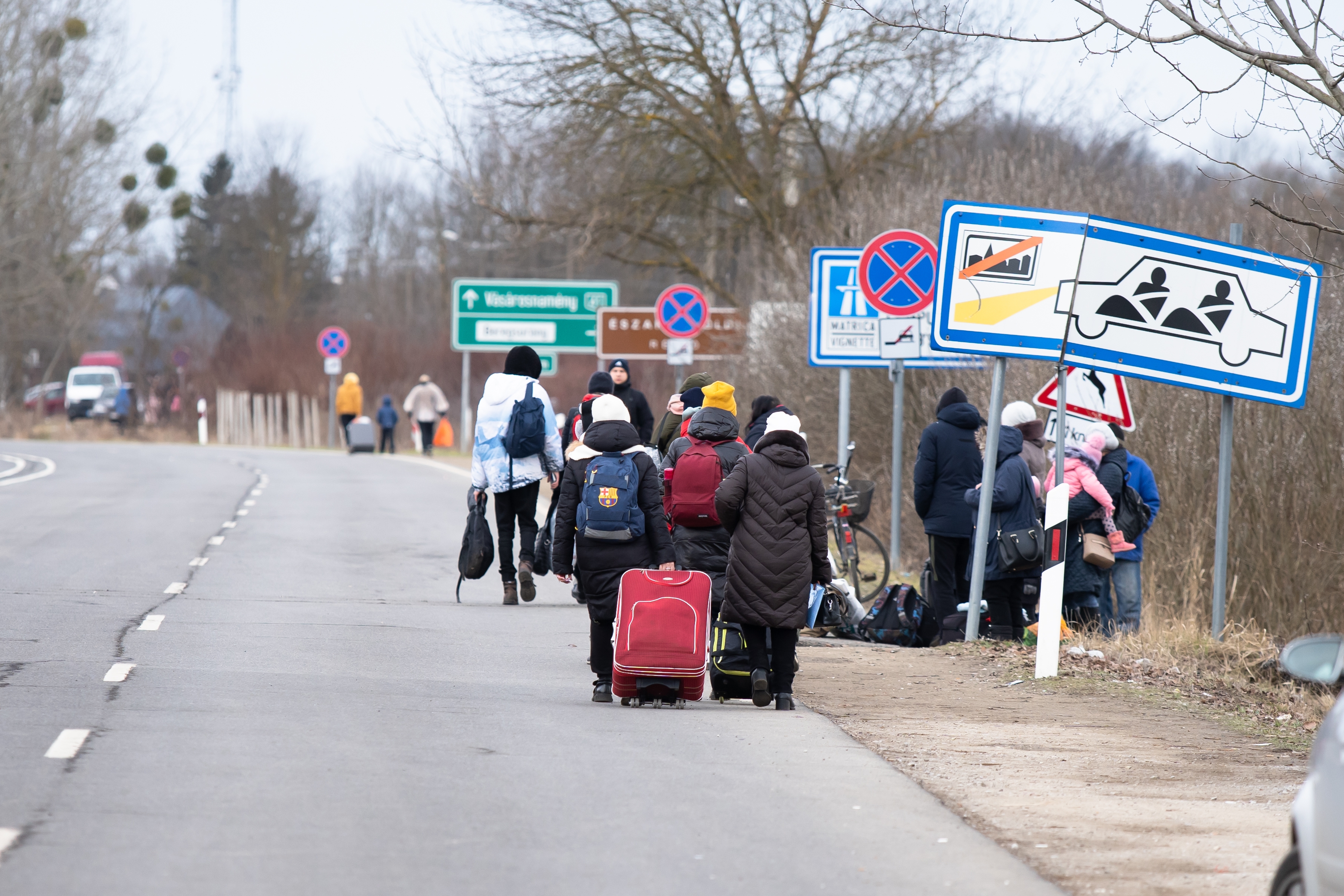In the western city of Lviv, the U.S. chargé d’affaires to Ukraine Kristina Kvien returned on Monday to the country for the first time since evacuating six weeks ago. Kvien joins Nick Schifrin to discuss new shipments of U.S. arms to Ukraine, sanctions against Russia and how the U.S. would define victory in the war.

As a nonprofit journalism organization, we depend on your support to fund coverage of global conflicts. Help us continue funding the hard costs of in-depth coverage of the Ukraine invasion—including travel, hostile environment safety training, and the increased security expenses that arise from reporting in war zones.
Read the Full Transcript
Nick Schifrin: In the Western city of Lviv, the U.S. acting ambassador, Kristina Kvien, returned to Ukraine for the first time since evacuating six weeks ago.
Kristina Kvien: Did you see this one?
Nick Schifrin: She went shopping. And her press attaché bought a T-shirt with Ukrainian soldiers' message to the invaders early in the war: "Russian warship, go (EXPLETIVE DELETED) yourself."
Kristina Kvien: I mean, the Ukrainians basically saying, no, we're not going to back down just because you're aiming your guns at us. We're going to stand up for our country. We're going to stand up for the sovereignty of our nation. And you can go do something else if you don't like that.
Nick Schifrin: Afterward, we sat down in Lviv's market square.
You were last here in Ukraine on February 22. Why have you returned today?
Kristina Kvien: Well, my security professionals have determined that it's safe to come. And we wanted to come as soon as we could. And so I'm back here today.
And what we very much hope is that it's signaling a return first to Lviv, but then ultimately to Kyiv. So we're working hard to get there and hope to do that by the end of the month.
Nick Schifrin: Let's talk about arms support and weapons going into Ukraine. The U.S., of course, has been sending artillery that is crucial for the fight in Eastern Ukraine.
Do you know if that artillery has arrived in Eastern Ukraine, so that the Ukrainians can use it against Russians in that territory?
Kristina Kvien: Right.
So we did recently say that we would provide howitzers. And over half of those have already reached Ukraine. I don't know where each individual one is located in the country, but I know that they're headed where they're needed. And we got them here as quickly as possible, so that Ukraine could defend itself against Russia's attacks in the east.
Nick Schifrin: The U.S. is refusing to provide Ukraine some longer-range artillery that the Ukrainians have requested. Why is that?
Kristina Kvien: I don't think that we are putting any sort of cap or limit on the range of our systems. I think we just been providing what we can quickly that can — that the Ukrainians can be trained on quickly, because, of course, if they can't use the equipment, it's not as useful.
Nick Schifrin: How does the U.S. define victory in this war?
Kristina Kvien: Ultimately, it's up for Ukraine to define victory, but, obviously, an independent Ukraine with its own government, the same government that's in power now, and peace.
And we will let Ukraine determine exactly what that victory looks like, because we don't want to presuppose for them any discussions they may be having.
Nick Schifrin: The British government has started talking publicly about victory, including Ukraine evicting Russia from all of Ukraine. That includes Eastern Donbass, where the Russians have occupied since 2014.
Does the U.S. agree with that?
Kristina Kvien: Crimea and Donbass are Ukraine. And if Ukraine chooses to defend its own territory, I don't think that we would have something negative to say about that.
Nick Schifrin: With all due respect, it sounds like there is no definition of victory that the U.S. government is willing to make?
Kristina Kvien: Well, we don't want to impose upon Ukraine what the victory is.
They — it's really up to Ukrainians to decide if and when they want to make any sort of concession to Russia. And we leave it to them to lay those guidelines out.
Nick Schifrin: Speaker of the House Nancy Pelosi, of course, yesterday used the word victory, but also Secretary of Defense Lloyd Austin said the U.S. goal is to weaken Russia's ability to wage war.
Is that a sign the U.S. aims are expanding?
Kristina Kvien: Well, I would say that Russia has clearly shown itself to be a very bad global actor.
So, while they're — what they're doing in Ukraine is horrible, horrific, they obviously have other countries that they border. Therefore, given the incredibly irresponsible behavior of President Putin, I think it's a — it's a pretty — let's say, it's — the idea that he can't do this to other countries and his border countries is certainly a valid one.
And a weakened — a weakened Russia would have a harder time of doing that in other border areas.
Nick Schifrin: And when you say weakened Russia, is that, as Secretary Blinken has said, strategic defeat long term, including sanctions, including export controls, and/or military defeat on the battlefield that would actually set Russia's military back multiple years?
Kristina Kvien: Well, first of all, I would say we want Ukraine to win. And to win, they need to defeat Russia. So, yes, I would say that there is a military component to that.
But, frankly, I don't see us removing sanctions or helping Russia out economically if it is not behaving as a good global actor. So if they want to be another North Korea, another Iran, another Syria that is completely isolated in the world, where no one will trade, then they have chosen that path.
And as long as they continue to act in the irresponsible way they have been acting, they're not going to be able to come back from that. It's not going to be business as usual.
Nick Schifrin: Increasingly, Moscow is saying that, because of more heavy us weapons coming to Ukraine, that this is more of a proxy fight between Russia and the U.S. Is it?
Kristina Kvien: No, it's a fight between Russia, who attacked Ukraine, and Ukraine. We're helping Ukraine, but it's Ukraine's fight. And Ukraine's fighting it very well.
Nick Schifrin: If Russia considers this a proxy fight, as it's publicly saying, are you worried about escalation, because Moscow has said it would rather escalate than lose?
Kristina Kvien: You know, President Putin likes to throw out a lot of bluster and a lot of threats, and we can't choose our policy or decide our policy based on his threats.
We have to base it on what the situation is and our commitment to help Ukraine win this fight.
Nick Schifrin: So that sounds like, no matter what kind of threats come out of Moscow, the U.S. will stay the course?
Kristina Kvien: Yes.
Nick Schifrin: OK.
And then, lastly, as we said, this is your first visit to Lviv in two months. Some of your European counterparts have already returned to Kyiv. Why not return to Kyiv?
Kristina Kvien: When they tell me it's safe to go back and bring my people back, I will do it. Obviously, we're here. So we have made a certain determination that we can safely travel here.
As soon as they tell me we can go back to Kyiv, we will be there, because we are very eager to go back.
Nick Schifrin: Kristina Kvien, thank you very much.
Kristina Kvien: Good. Well, it's good to see you. Thank you.
Judy Woodruff: And a note: Our coverage of the war in Ukraine is supported in partnership with the Pulitzer Center.











